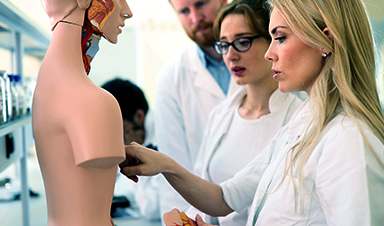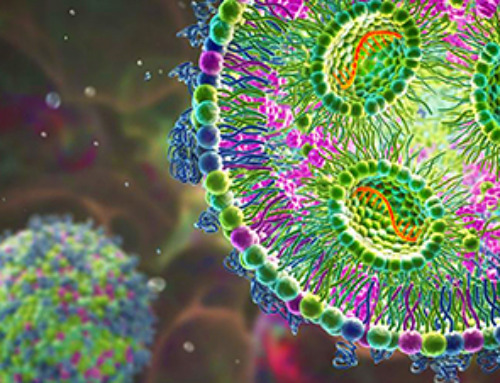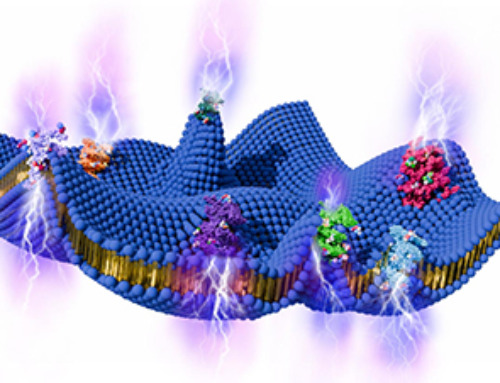Abstract
The progressive growth in nanotechnology approaches to diagnostics and therapeutics, especially for cancer, necessitates training physicians in nanoethics. This article explains why it is critical for medical education to include instruction in nanotechnology, nanomedicine, nanotoxicology, and nanoethics and suggests basic concepts educators can use to infuse curricula with this content.
Introduction
As it continues to evolve to meet the needs of the next generation of clinicians, medical education should incorporate new interventions and diagnostics, among them nanotechnology applications. Nanotechnology is a science built on fundamental changes in material properties because of unique chemical, physical, mechanical, and optical properties that occur when particle size falls into the nanorange. The nanoscale ranges from 1 to 100 nm, as that is the size at which many of the special properties particular to the nanoscale arise, although most unique properties arise below 30 nm.1 However, the entire 1 to 999 nm range is sometimes included under the heading of nanotechnology. Optical properties of some materials (eg, the fluorescence signature of quantum dots and the color of nanogold) are determined simply by the size of the nanoparticles, not by the choice of material.2 At this scale, surface chemistry and charge dramatically increase bioimaging and biosensing capabilities.3,4 In addition, nanoparticle size, shape, and surface charge can dictate how nanoparticles are processed and signals are amplified in the body.5-9
Although nanotechnology has brought together the fields of materials science, engineering, and medicine in the development of diagnostic and treatment options in medicine and surgery,10 nanomedicine and nanotechnology have not been included in recent influential publications on medical education reform such as the Association of American Medical College and the Howard Hughes Medical Institute’s “Scientific Foundations For Future Physicians.”11 However, it is imperative that the next generation of physicians understand these developments so that they can be better prepared to provide consultation to scientists about potential applications, integrate nanotechnology-based therapeutic choices into practice, and respond to ethical challenges.12 This article explains why it is critical for medical education to include instruction in nanotechnology, nanomedicine, nanotoxicology, and nanoethics and suggests basic concepts educators can use to infuse curricula with this content.
The Importance of Nanotechnology to Medicine
While its use is still early, nanotechnology promises to revolutionize medical care. The number of nanotechnology-based drugs, devices, and diagnostics clinically available and in clinical trials is growing rapidly. Many of the early applications of nanotechnology have been in the field of drug delivery and have allowed for new agents with improved pharmacologic or pharmacodynamics profiles. Underlying these advances is the enhanced permeability and retention effect (EPR) in solid tumors, which allows for the passive or active accumulation of nanoformulated drugs at the site of solid tumors at higher levels than in the rest of the body.13 Major clinical examples of such drugs include US Food and Drug Administration (FDA)-approved cancer nanochemotherapeutics such as nanoparticle albumin-bound paclitaxel,14 liposomal doxorubicin,15 liposomal daunorubicin,16 liposomal daunorubicin-cytarabine,16 and liposomal vincristine.17 Emerging applications of nanotechnology for treating cancer include more targeted approaches, stimuli-responsive delivery agents, combinatorial approaches, gene therapeutics, and immunotherapies.18-21 Additionally, there are hundreds of new technologies in preclinical development.22
Image Credit: Envato / Alias Creative
News This Week
Nanomedicine in 2026: Experts Predict the Year Ahead
Progress in nanomedicine is almost as fast as the science is small. Over the last year, we've seen an abundance of headlines covering medical R&D at the nanoscale: polymer-coated nanoparticles targeting ovarian cancer, Albumin recruiting nanoparticles for [...]
Lipid nanoparticles could unlock access for millions of autoimmune patients
Capstan Therapeutics scientists demonstrate that lipid nanoparticles can engineer CAR T cells within the body without laboratory cell manufacturing and ex vivo expansion. The method using targeted lipid nanoparticles (tLNPs) is designed to deliver [...]
The Brain’s Strange Way of Computing Could Explain Consciousness
Consciousness may emerge not from code, but from the way living brains physically compute. Discussions about consciousness often stall between two deeply rooted viewpoints. One is computational functionalism, which holds that cognition can be [...]
First breathing ‘lung-on-chip’ developed using genetically identical cells
Researchers at the Francis Crick Institute and AlveoliX have developed the first human lung-on-chip model using stem cells taken from only one person. These chips simulate breathing motions and lung disease in an individual, [...]
Cell Membranes May Act Like Tiny Power Generators
Living cells may generate electricity through the natural motion of their membranes. These fast electrical signals could play a role in how cells communicate and sense their surroundings. Scientists have proposed a new theoretical [...]
This Viral RNA Structure Could Lead to a Universal Antiviral Drug
Researchers identify a shared RNA-protein interaction that could lead to broad-spectrum antiviral treatments for enteroviruses. A new study from the University of Maryland, Baltimore County (UMBC), published in Nature Communications, explains how enteroviruses begin reproducing [...]
New study suggests a way to rejuvenate the immune system
Stimulating the liver to produce some of the signals of the thymus can reverse age-related declines in T-cell populations and enhance response to vaccination. As people age, their immune system function declines. T cell [...]
Nerve Damage Can Disrupt Immunity Across the Entire Body
A single nerve injury can quietly reshape the immune system across the entire body. Preclinical research from McGill University suggests that nerve injuries may lead to long-lasting changes in the immune system, and these [...]
Fake Science Is Growing Faster Than Legitimate Research, New Study Warns
New research reveals organized networks linking paper mills, intermediaries, and compromised academic journals Organized scientific fraud is becoming increasingly common, ranging from fabricated research to the buying and selling of authorship and citations, according [...]
Scientists Unlock a New Way to Hear the Brain’s Hidden Language
Scientists can finally hear the brain’s quietest messages—unlocking the hidden code behind how neurons think, decide, and remember. Scientists have created a new protein that can capture the incoming chemical signals received by brain [...]
Does being infected or vaccinated first influence COVID-19 immunity?
A new study analyzing the immune response to COVID-19 in a Catalan cohort of health workers sheds light on an important question: does it matter whether a person was first infected or first vaccinated? [...]
We May Never Know if AI Is Conscious, Says Cambridge Philosopher
As claims about conscious AI grow louder, a Cambridge philosopher argues that we lack the evidence to know whether machines can truly be conscious, let alone morally significant. A philosopher at the University of [...]
AI Helped Scientists Stop a Virus With One Tiny Change
Using AI, researchers identified one tiny molecular interaction that viruses need to infect cells. Disrupting it stopped the virus before infection could begin. Washington State University scientists have uncovered a method to interfere with a key [...]
Deadly Hospital Fungus May Finally Have a Weakness
A deadly, drug-resistant hospital fungus may finally have a weakness—and scientists think they’ve found it. Researchers have identified a genetic process that could open the door to new treatments for a dangerous fungal infection [...]
Fever-Proof Bird Flu Variant Could Fuel the Next Pandemic
Bird flu viruses present a significant risk to humans because they can continue replicating at temperatures higher than a typical fever. Fever is one of the body’s main tools for slowing or stopping viral [...]
What could the future of nanoscience look like?
Society has a lot to thank for nanoscience. From improved health monitoring to reducing the size of electronics, scientists’ ability to delve deeper and better understand chemistry at the nanoscale has opened up numerous [...]






















Leave A Comment